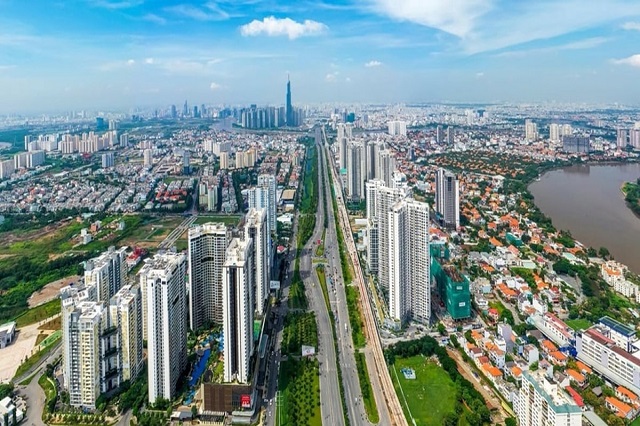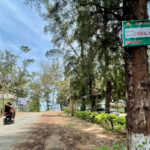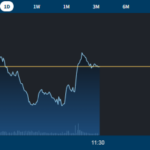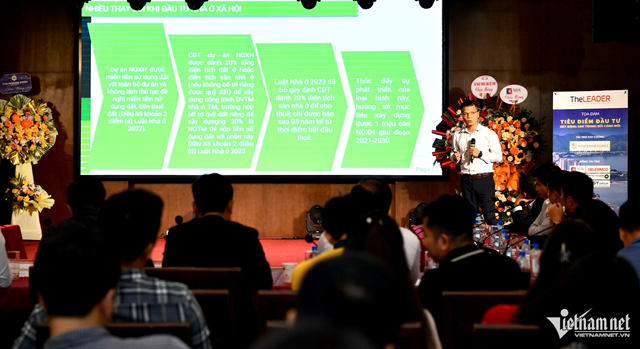
On October 21, 2024, the People’s Committee of Ho Chi Minh City officially issued a decision to adjust the land price framework for 2020. The new land price framework will be applied from October 31, 2024, to December 31, 2025.
The new land price framework marks a significant adjustment compared to Decision No. 02/2020. Accordingly, land prices in some districts and counties have increased sharply, with prices doubling in some areas. In the central areas of Nguyen Hue, Le Loi, and Dong Khoi (District 1), the highest land price reached VND 687.2 million per square meter, more than four times higher than before. Ham Nghi and Han Thuyen streets also recorded similar increases, while some routes in Hoc Mon district, such as the National Highway 22 Parallel Road, increased more than 38 times.
Positive impacts of the new land price framework
Mr. Nguyen Quang Huy – CEO of Finance and Banking, Nguyen Trai University, stated that the announcement of the new land price framework would bring adjustments to the real estate market and have numerous social benefits.
Firstly, the new land price framework reflects the true value of the land. It will help state management agencies and the real estate market adjust land values to better match reality. This reduces the gap between actual transaction values and state-issued prices, creating a foundation for more transparency and fairness in asset valuation.
Secondly, it increases budget revenues from land auctions. Implementing the new land price framework will generate more significant revenue from land auction activities. This financial resource is crucial for local authorities to invest in infrastructure projects, improve living standards, and promote socio-economic development. It also lays a better foundation for future investment and urban development initiatives.
Thirdly, the new land price framework will encourage investment in new areas. As land prices rise in central areas, investors will be motivated to seek opportunities in peripheral regions or newly developing areas. This will lead to a more balanced distribution of the population, reducing pressure on central districts and promoting equitable growth across regions.
Mr. Huy suggested that to optimize land use efficiency and support sustainable urban development, there should be a harmonious balance between developing auction land plots and new projects. Increasing the proportion of land designated for high-rise apartments would optimize land use efficiency and increase living space for residents. This approach addresses housing needs amidst a growing population and contributes to vertical urbanization, reducing the need to expand horizontally.
The adjustment of the land price framework presents an opportunity for the city’s authorities to promote social housing projects and accommodations for middle-income earners. This strategy is vital for ensuring social welfare and creating a diverse real estate market that caters to the needs of various demographic groups.
Short-term challenges
The increase in land prices brings not only positive impacts but also short-term difficulties for investors. Higher land prices result in significantly higher compensation costs for site clearance, leading to increased real estate production costs. This, in turn, creates pressure on investors regarding investment cost management and market product pricing.
To cope with rising input costs, investors need to redesign their products with optimized solutions. This includes smart structural and functional designs, environmentally friendly materials, technology-driven construction methods to shorten project durations, and ensuring that products meet the needs and financial capabilities of the target population.
Mr. Huy suggested that these solutions would make real estate products more reasonably priced and accessible to actual home buyers, especially those with middle incomes. This approach would help maintain purchasing power and market stability while reducing the risk of price speculation.
Long-term impacts on the real estate market
The adjustment of the new land price framework will have long-lasting effects on the real estate market.
Firstly, it enhances the appeal of well-planned projects. The rise in land prices underscores the importance of comprehensive and synchronized planning. Real estate projects with favorable locations, good infrastructure, and well-invested developments will become more attractive, drawing in investors and homebuyers.
Secondly, it reorients investment strategies. Investors will need to shift their focus to areas with potential infrastructure development or projects offering long-term sustainable value. This shift will guide the real estate market toward value-driven investments rather than mere speculation.
In the context of changing land prices, Mr. Huy advised investors to exercise caution to avoid risks. Instead of engaging in short-term speculation, investors should focus on well-planned projects with favorable locations and sustainable profit potential. This approach reduces risks during market fluctuations.
As higher land prices can lead to real estate price inflation, investors need to be prudent and consider the actual value of each area, avoiding the temptation to follow unsustainable price hikes. Investors should also stay updated with new tax regulations and policies to align their investment strategies accordingly, mitigating risks from sudden market changes.
Mr. Le Hoang Chau – Chairman of Ho Chi Minh City Real Estate Association (HoREA), shared a similar perspective. He stated that the adjusted land price framework was built following the land pricing principles stipulated in Article 158 of the 2024 Land Law. It employed market-based pricing methods and adhered to the proper procedures, ensuring a balance of interests between the state, land users, and investors.
Mr. Chau noted that the adjusted land price framework would not immediately impact the real estate market, as commercial real estate projects are currently priced mainly based on the “surplus method.” However, it will have an effect in the “second phase” when real estate businesses acquire land use rights for real estate, urban, and commercial and social housing projects. In this phase, landowners may have the psychology of wanting to sell at a higher price than before, leading to pressure to push up housing prices.
Therefore, the Association also proposed that authorities take effective measures to control the activities of “land speculators, land brokers, and unscrupulous enterprises” who may take advantage of the new land price framework to engage in land speculation, price manipulation, and market disruption for illicit gains.
In conclusion, the new land price framework adjustment in Ho Chi Minh City is a significant step forward, reflecting the city’s development and the need to adapt to new realities. Despite short-term challenges, the announcement of the new land price framework brings about numerous positive impacts, fostering the sustainable development of the real estate market. It ensures transparency, fairness, and promotes the comprehensive advancement of the urban landscape. Investors are advised to adopt long-term strategies, remain cautious amidst fluctuations, and seize opportunities presented by new policies to contribute to the overall growth of the market.
Billion-Dollar Projects Seek Investors in Binh Dinh Province
The People’s Committee of Binh Dinh Province has recently unveiled plans to auction land-use rights for a prestigious development project. This project encompasses the construction of a 5-star hotel, office spaces for lease, and a vibrant commercial and service center in the heart of Nguyen Van Cu Ward, Quy Nhon City, Binh Dinh Province.
The Short-Term Absorption Effort Continues: Bank Stocks Keep the Beat
Another flash sale appeared this morning, even overwhelming the VN-Index in the red for most of the trading session. HoSE trading volume rose nearly 11% from yesterday’s morning session, and many stocks are rebounding, indicating that bottom-fishing efforts have been somewhat effective.
“Sustainable Agriculture in Thanh Hoa: Embracing Green Practices for a Prosperous Future”
Organic farming practices are gaining traction among households and cooperatives in Thanh Hoa province. By embracing eco-friendly and sustainable agricultural methods, they are producing goods that are not only safe for consumers but also environmentally conscious. This approach is pivotal to fostering long-term growth in the agricultural economy, minimizing environmental footprints, and promoting the well-being of the community.





















